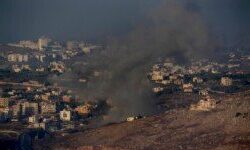Galilee, Israel—The morning light was muted, overshadowed by the roar of rockets and the sirens that screamed across the hills of Galilee. One hundred rockets, fierce and unrelenting, surged from Lebanon toward Israel’s northern towns, leaving flames, fear, and shattered lives in their wake. This marked the second day of renewed conflict between Israel and Hezbollah, a bitter exchange that has once again pulled the sky and the earth into its violent dance.
Fire in the Sky: Rockets Shatter Peace Across Northern Israel
Fifty rockets tore into the heart of Alta Galilea, while others rained down near Haifa, igniting the ground and leaving scars in homes and hearts. The Israel Defense Forces (IDF) swiftly retaliated, targeting the launchers from which Hezbollah’s projectiles had flown. But between the rockets and the counterstrikes, it was the people who truly suffered, their lives once again placed on the edge of a knife.
Along the highways, cars came to a sudden stop as fear took over. Drivers abandoned their vehicles, lying flat against the earth as the sky above erupted in explosions. In a now-viral video, these ordinary moments of terror were captured, showing civilians pinned to the ground, hoping that the rain of fire would pass without taking more than it already had.
Wounds Beyond the Body: Communities Shattered, Hearts Broken
At the Galilee Medical Center, two patients arrived with head injuries, their car narrowly missed by a rocket. Yet, they were the lucky ones. Many others stumbled in, bruised and cut, not by the rockets themselves but by the chaos they caused—people injured in panicked rushes to safety or accidents that occurred as the alarms blared.
In Lebanon, the cost was even higher. On Monday, Israeli airstrikes struck with brutal force, claiming nearly 500 lives and injuring more than 1,600 people. As the IDF intensified operations, entire villages emptied, and families fled, hoping to escape the escalating violence. The suffering was felt on both sides of the border, as Hezbollah’s rocket attacks mirrored Israel’s airstrikes, each strike an echo of the other’s pain.
The Exodus: Fleeing Homes, Fleeing War
In the south of Lebanon, where the rockets fell hardest, families packed what they could and fled. Thousands took to the roads, their cars filled with hastily gathered belongings, their eyes filled with fear. In Beirut and Sidon, classrooms became shelters, makeshift homes for those with nowhere else to go. Some, finding no room or refuge, spent the night in their cars, under the stars, or in the quiet spaces of parks, the weight of war heavy in their hearts.
Still, in the darkest hours, human kindness flickered like a fragile flame. Strangers opened their doors, offering rooms and food to those displaced by the violence. Social media lit up with posts from those willing to share their homes, while volunteers set up kitchens in the most unexpected places—a gas station in Beirut became a refuge where warm meals were prepared and handed out to those in need. In the face of war, compassion endured.
Lebanon Ablaze: A Land Ravaged by Bombs and Fire
Satellite images tell a story that words cannot. Flames, not born of nature but of war, spread across 650 square miles of Lebanon’s south. From the border near Naqoura, a town that watches over the sea, to the deep valleys of Bekaa, the land burns. Villages, once filled with the sounds of everyday life, are now ghostly quiet, the smoke of bombings rising above them like a dark shroud.
On Monday alone, Israel launched hundreds of airstrikes, targeting not only Hezbollah’s military positions but also areas close to UN peacekeeping bases. The bombings turned fields into ash, homes into rubble, and roads into rivers of fleeing families. The once peaceful roads of Southern Lebanon and the valleys that cradle life are now filled with the silence of loss and the heavy footsteps of those searching for safety.
The Human Toll: A World on Fire, A People in Flight
The war’s violence is mirrored in the thousands of families who have packed their lives into cars and left everything behind. Monday’s mass exodus turned the highway to Beirut into a lifeline of survival, clogged with vehicles heading north, each car a small vessel of hope in the storm of war. Hotels in the capital filled quickly, while the mountains surrounding the city became home to those seeking refuge.
In Baalbek, far from the coast but not far enough from the war’s reach, residents lined up outside bakeries and gas stations, their carts filled with bread and essentials, their faces set with grim determination. In times like these, when bombs fall and rockets soar, survival means preparing for the worst, hoping only that tomorrow will not bring more of the same.


